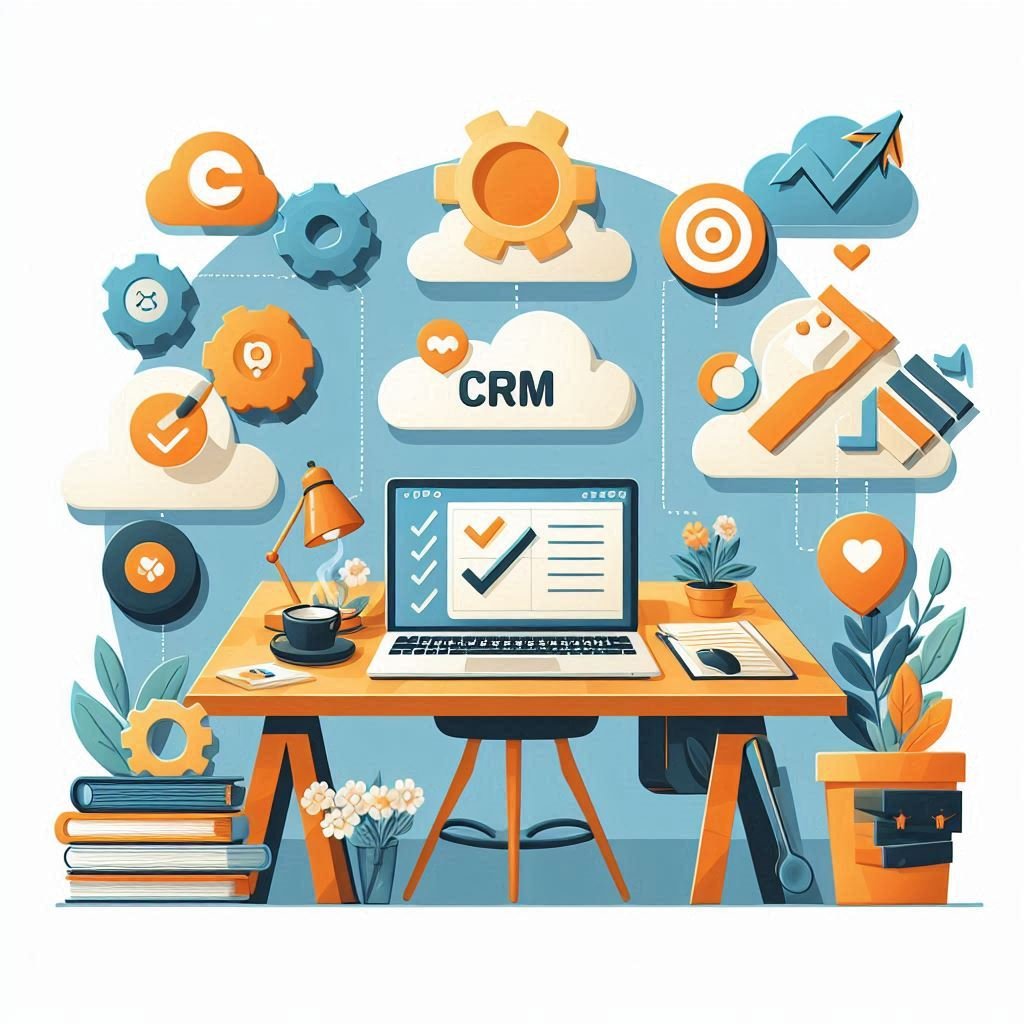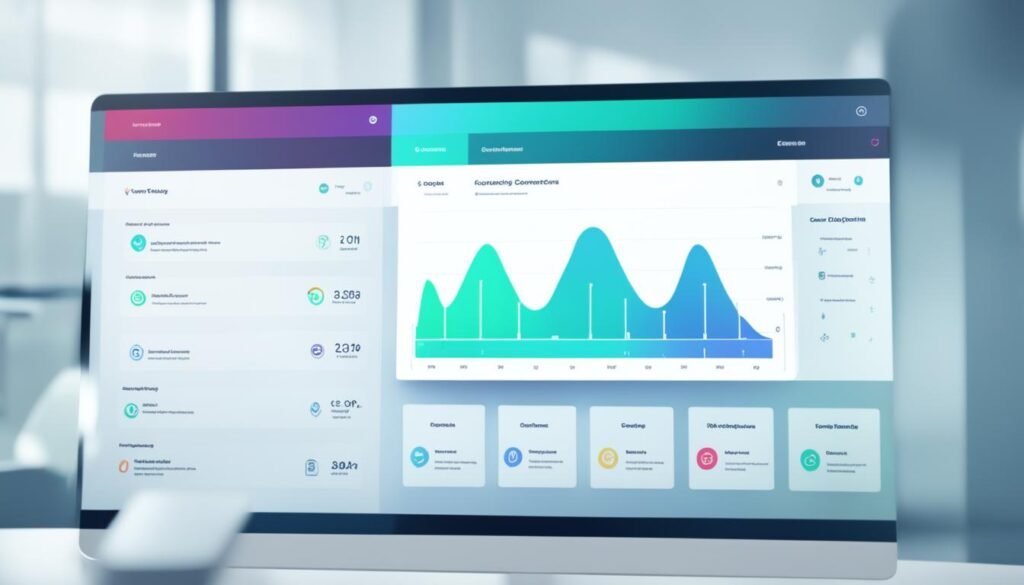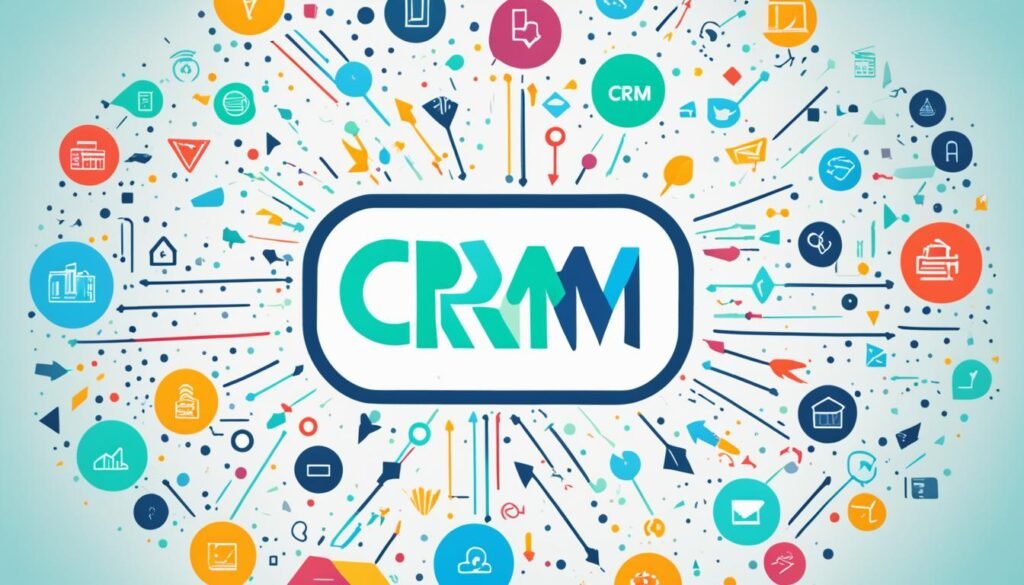As a small business owner, managing customer interactions across sales, service, and marketing can be tough. The right CRM system can make a big difference. It helps you and your team use customer data well to grow your business.
This article will cover key CRM best practices. You’ll learn how to pick a CRM Implementation and use its features. It will also show you how to use your CRM strategy to improve customer experience. You’ll see how the right CRM software can give you insights into what your customers want.
It can help you deliver products, services, and support that keeps customers coming back.
Table of Contents
Define Your CRM Implementation Based on Business Goals
Creating a strong CRM strategy is key for small businesses. It helps align customer management with business goals. Start by looking at how you interact with customers now. This helps you see where you can do better.
Then, pick a CRM Implementation tool that fits your goals. It should have the right features to support what you want to achieve.
Understand Your Customer Interactions
Map out your customer’s journey to see where you can make things better. A Salesforce report says 62% of customers expect companies to change based on their actions. Knowing how customers interact with you lets you customize your CRM to meet their needs.
Identify Key Business Objectives
Set clear goals for your CRM strategy. Do you want to boost sales, keep customers longer, or make marketing and sales better? Specific, Measurable, Achievable, Relevant, and Time-bound (SMART) goals help you track progress and keep your CRM in line with your business aims.
Choose CRM Features Aligned with Goals
After setting your goals, pick a CRM that fits them. If you want to improve customer experience, find a CRM with great customer data management and personalization. The right CRM features can boost your strategy and bring real business results.
| Business Objective | Relevant CRM Features |
|---|---|
| Increase Sales | Lead management, sales automation, pipeline visibility |
| Improve Customer Retention | Customer segmentation, retention campaigns, customer journey mapping |
| Enhance Marketing Effectiveness | Automated marketing campaigns, customer insights, campaign analytics |

“Implementing a CRM strategy can lead to increased revenue through enhanced customer relationships and reduced costs associated with customer acquisition, retention, and upselling.”
Select the Right CRM Platform
Choosing the right CRM platform is key for small businesses. Look for features that match your business needs, are easy to use, and fit your budget. Also, consider how mobile-friendly and scalable it is. This way, you’ll find a platform that helps your business grow and improve customer relationships.
Evaluate Features and Functionality
First, think about the CRM features you need. Do you want lead management, marketing automation, or sales tracking? Make a list of what’s essential for your business. This will help you pick the right CRM platform.
Assess Ease of Use
It’s important that your CRM system is easy to use. Look for platforms with simple interfaces and quick training. This ensures your team can use the CRM features effectively right away.
Consider Pricing and Budgeting
CRM pricing can range from $8 to $249 per user monthly. Compare the features, scalability, and costs of each CRM platform to fit your budget. Some offer free plans for small businesses to start with.
Ensure Mobile Access
Today, having a CRM platform that works on mobile devices is a must. Choose a solution that offers great mobile experiences. This lets your team stay connected and productive anywhere.
Prioritize Scalability
Your CRM system should grow with your business. Pick a CRM platform that can handle more users and data easily. This ensures a smooth growth without any hitches.
By thinking about these factors, you can find a CRM platform that meets your business needs. It should offer the right features, be easy to use, and grow with your company.

CRM Implementation Strategy
Implementing CRM in small businesses needs a strategic plan. This plan should map out current customer processes, find key data capture spots, use user feedback, and offer full training. A clear CRM implementation strategy ensures easy adoption and gets the most out of your new system.
Map Out Current Customer Processes
Start by understanding your current customer interactions and touchpoints. Analyze your customer journey, looking at each stage, communication ways, and data capture spots. This will help you make your CRM system fit how you interact with customers now.
Identify Data Capture Points
Good CRM implementation relies on accurate customer data. Review your current data capture spots, both online and offline, to see where you can improve. Know what important data to collect at each customer stage, from first contact to after purchase. Strong data capture helps your CRM give valuable insights and support smart decisions.
Conduct User Testing and Feedback
Before making your CRM system company-wide, get feedback from a group of employees. Do user testing to learn about the system’s ease of use, functionality, and how it fits into daily tasks. This approach helps fix any issues, making the switch smoother and boosting user acceptance.
Provide Comprehensive Training
Training is key to successful CRM implementation. Create a thorough training plan that covers everything from entering data to making reports. Use a mix of workshops, online tutorials, and ongoing support to make sure your team knows the CRM well. Good training means better data, smoother workflows, and smarter decisions.
With a solid CRM implementation strategy, you can fully benefit from your CRM system. Focus on mapping customer processes, finding data capture spots, using user feedback, and providing full training. This sets the stage for a successful CRM in your small business.

Optimize Workflows for Data Capture
When setting up your CRM system, focus on making your data capture workflows efficient. Map the customer journey and connect your CRM with other tools to make data entry easier. This way, you can use powerful analytics to understand your customers better.
Map the Customer Journey
Get to know your customers by mapping their journey with your business. Find key moments to collect data, like website visits or email interactions. This approach helps you capture data well and gives customers a smooth experience.
Integrate Existing Tools
Link your CRM with tools like your website, email, and project management systems. This makes data entry automatic, cuts down on mistakes, and gives a full view of customer interactions. Automating data helps you build stronger customer relationships and grow your business.
Standardize Data Entry
Teach your team how to record customer info in the CRM consistently. Use the same formats and rules for data entry to keep it accurate. Regular cleaning of data also improves the quality of your CRM.
Leverage CRM Analytics
Use your CRM’s analytics to learn more about your customers and your business. Look at reports on customer behavior and sales opportunities. This helps you make smart decisions and improve the customer experience.
| Metric | Impact |
|---|---|
| CRM Data Capture Optimization | Companies that use customer analytics well are 23 times more likely to beat competitors in getting new customers and keeping old ones. |
| Data Standardization | Regular data cleaning boosts lead conversion by 23% compared to outdated data. |
| CRM Integration | Integrating CRM with other tools improves data visibility by 40% and boosts teamwork by 28%. |
| CRM Analytics Utilization | Small businesses using CRM analytics see a 20% revenue increase through targeted marketing and better customer engagement. |
By improving your CRM workflows, integrating systems, standardizing data, and using analytics, you can gain valuable insights. This helps drive growth and improves the customer experience.

CRM Implementation Best Practices
Using your CRM software well can greatly improve your small business. It helps you track customer interactions, find important sales chances, and make your marketing better. This makes your CRM strategy more effective.
Track Customer Interactions
Look at customer data in your CRM to learn more about them. This helps you serve them better. By watching how they interact, you can improve your customer service. You’ll know what they need and can solve their problems before they ask.
Identify Sales Opportunities
Your CRM can find sales chances you might miss. It looks at purchase history and behavior to spot trends. This lets you find great leads, make your sales better, and find new ways to make money.
Improve Marketing Campaigns
Use CRM data to make your marketing better. Create campaigns that speak directly to your customers. This makes them more likely to engage and buy from you.
Continuously Refine Your Strategy
Check how your CRM is doing and adjust your plans as needed. Stay ready to change, making sure your CRM best practices meet your business goals and what your customers want.
“When salespeople see the value of CRM systems, success on a company-wide scale becomes attainable.”
By following these tips, you can make the most out of your CRM. This will improve how you talk to customers, find sales chances, and run marketing campaigns. Always making your CRM strategy better will keep your business ready to adapt to customer needs.
Conclusion
An effective CRM strategy is key for small business growth. It helps you understand your customers better and improve your products. By using CRM analytics, you can make your offerings and customer experiences better.
Mastering customer data with a strong CRM strategy means you can deliver amazing products. This will make your customers happy across all channels. With good planning and training, an effective CRM can change how you manage customer relationships. It can also increase your profits.
This article has given you insights and best practices to improve your CRM. You can make your small business better by following these steps. From setting your strategy to choosing the right platform, a good CRM strategy is crucial for growth and great customer experiences.
Remember, a CRM system is more than just a tool. It’s a strategic asset that can take your small business to new heights. By using CRM, you can beat the competition, keep customers coming back, and set your company up for long-term success in the fast-paced small business world.



